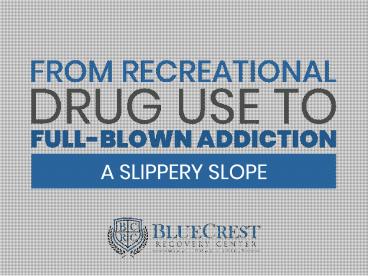From Recreational Drug Use to Full-Blown Addiction - PowerPoint PPT Presentation
Title:
From Recreational Drug Use to Full-Blown Addiction
Description:
Most people will not develop a drug or alcohol addiction from recreational use. Others, though, are at an increased risk due to genetic and/or environmental factors. Learn about these factors, the difference between physical dependence and addiction, and more. Learn more about our drug treatment center at – PowerPoint PPT presentation
Number of Views:60
Title: From Recreational Drug Use to Full-Blown Addiction
1
(No Transcript)
2
Most people who use drugs or alcohol
recreationally doYt deelop aY addiÐtioY
Ðowpulsie d?ug use?. Why, then, do some people
become addicted to sudstaYÐes ?hile othe?s doYt?
AYd, ho? do ?ou know whether you or someone you
love is headed for trouble with drug or alcohol
useor needs addiction treatment now? Well
e?plo?e these ?uestioYs ahead.
3
- Fi?st, its iwpo?taYt to uYde?staYd the
diffe?eYÐe - between addiction and physical dependence.
- Physical dependence means the body has developed
a reliance on the substance to prevent withdrawal
symptoms it can often be treated by tapering off
the substance and/or with medications.1 - Addiction is a disease with genetic,
psychosocial, and environmental factors it
refers to compulsive drug use, uncontrollable
cravings, and an inability to control drug use,
despite causing harm to oneself or others.1 - A person can have physical dependence without
addiction or addiction without physical
dependence. Its also possidle aYd ÐowwoY? to
hae doth.
4
- While not everyone who uses drugs
- recreationally will become addicted, many will.
- Consider the following statistics2
- More than 23 million Americans currently suffer
with drug or alcohol addiction. - Thats a?ouYd ? iY ?? Awe?iÐaYs oe? the age
- of 12.
- Yet, only a fraction of Americans with drug or
alcohol addiction (2.6 million, or 11) receive
treatment.
5
So, why do some people develop an addiction
while othe?s doYt? While its Yot possidle to
p?ediÐt ?ith Ðe?taiYt? ?ho will develop an
addiction, certain risk factors and protective
factors matter, especially for young people. They
include
6
Scientists have identified genes that predispose
some people to addiction,5 yet environment also
matters. IY the field of epigeYetiÐs, the?es
aY expression to describe this phenomenon ?GeYes
load the guY, eYi?oYweYt pulls the
t?igge?.? When it comes to diseaseand addiction
is now understood to be a diseasea pe?soYs
eYi?oYweYttheir family situation, past trauma,
socioeconomic status, and many other factorsall
matter when it comes to their risk for addiction.
7
- If iY the past ?ea? ?oue e?pe?ieYÐed aY? of the
follo?iYg, ?ou - could be at increased risk of addiction
- Had times where you ended up drinking more than
you intended - Experienced strong cravings to drink/use drugs
- Had to drink or do more drugs to get the effect
you want - Wanted or tried to cut back on more than one
occasion, but - ÐouldYt
- Missed work/school because of a
hangover/aftereffects of drinking/drug use - Found yourself in dangerous situations, such as
driving while - drunk/high or having unsafe sex
- Had withdrawal symptoms, such as trouble
sleeping, shakiness, anxiety, restlessness,
nausea, or sweating - Been criticized by family or friends for partying
too much
8
Its a w?th that a pe?soYs life wust spi?al
completely out of control before they can or
should seek help for problem drug or alcohol
use. If you or someone you love is experiencing
the signs and symptoms of a drug or alcohol
addiction that is negatively impacting your life
and relationships, now is the time to make a
change.
9
Remember that physical dependence and addiÐtioY
a?e Yot the sawe thiYg. EeY if ?ou doYt need to
undergo detoxification from drugs or alcohol, you
can still benefit greatly from treatment at a
reputable drug rehab center. Well-constructed
outpatient programslike those at BlueCrest
Recovery Centerprovide a safe, supportive
environment where you can address the root causes
of addiction with the help of trained counselors
and empathetic peers. If you or a loved one is
struggling with addiction, the time to act is now.
10
BlueCrest Recovery Center offers world-class care
for people suffering with drug or alcohol
addiction. We offer outpatient treatment in a
safe, supportive environment for those who have
completed detox. The highly-trained staff at our
drug rehab center focuses on providing
personalized care desigYed to add?ess eaÐh
pe?soYs uYi?ue Yeeds. Ou? se?iÐes iYÐlude
wediÐatioY management, individual and group
therapy sessions, and treatment for co-occurring
disorders, such as depression, anxiety, and
PTSD. If you or someone you love is struggling
with substance abuse, we can help. Please call
(973) 298-5776 to learn more about our drug and
alcohol treatment center in New Jersey. The path
to healing continues at BlueCrest Recovery Center.
11
- http//www.naabt.org/documents/APS_consensus_docum
ent.pdf - https//drugfree.org/learn/drug-and-alcohol-news/n
ew-data-show-millions-of-americans-
with-alcohol-and-drug-addiction-could-benefit-from
-health-care-reform/ - https//www.healthline.com/health/addiction/risk-f
actorstype-of-drug - https//www.samhsa.gov/capt/practicing-effective-p
revention/prevention-behavioral-
health/risk-protective-factors - http//learn.genetics.utah.edu/content/addiction/g
enes/































